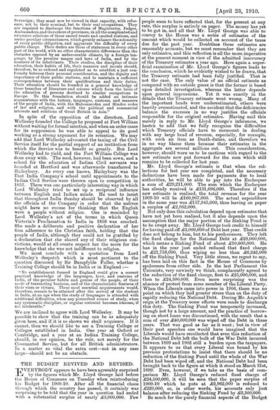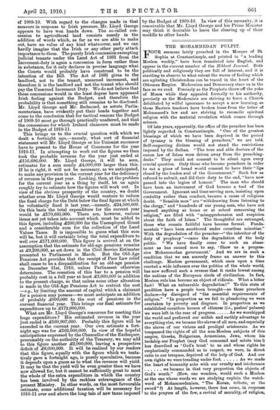THE BUDGET REVIVED AND REVISED.
-FAVERYBODY appears to have been agreeably surprised U by the figures which Mr. Lloyd George laid before the House of Commons on Tuesday when reintroducing his Budget for 1909-10. After all the financial chaos through which the country has passed, it certainly was surprising to be told that the year in question had ended with a substantial surplus of nearly £3,000,000. Few people seem to have reflected that, for the present at any rate, this surplus is entirely on paper. The money has yet, to be got in, and all that Mr. Lloyd. George was able- to convey to the House was a series of estimates of the amount which would be collected on account of the taxes due for the past year. Doubtless these estimates are reasonably accurate, but we must remember that they are only estimates, and this reflection is all the more imperative at the present moment in view of the admitted inaccuracy of the Treasury estimates a year ago. Here again a, super- ficial examination of Mr. Lloyd George's figures leads to the conclusion, which he evidently wished to be drawn, that the Treasury estimate had been fully justified. That is not the case, The only value of an official estimate as compared with an outside guess is that the former is based upon detailed investigation, whereas the latter depends upon general impressions. Yet it was exactly in the details that the Treasury estimate went wrong, . Many of the important heads were underestimated, others were heavily overestimated, and the accident that the deficiencies balance the excesses in no way justifies the officials responsible for the original estimates. Having said this merely in reply to Mr. Lloyd George's inferences, we hasten to add that we fully recognise the difficulties which Treasury officials have to surmount in dealing with any large head of revenue, especially, for example, with such an item as Death-duties, and therefore we in no way blame them because their estimates in the aggregate are several millions out. This consideration, however, should warn us to be cautious with regard to the new estimate now put forward for the sum which still remains to be collected for last year.
Mr. Lloyd George's estimate is that when the col- lections for last year are completed, and the necessary deductions have been made for payments due to local authorities, he will be able to pay into the Exchequer a sum of £29,211,000. The sum which the Exchequer has already received is £131,696,000. Therefore if the new estimate is realised, the total revenue for the year 1909-10 will be £160,907,000. The actual expenditure in the same year was £157,945,000, thus leaving on paper a surplus of £2,962,000.
Not only does this calculation depend upon estimates that have not yet been realised, but it also depends upon the assumption that the major portion of the Sinking Fund is to be swept away. Mr. Lloyd George took credit to himself for having paid off £3,000,000 of Debt last year. That credit does not belong to him, but to his predecessors. They left the fixed charge for the National Debt at £28,000,000, which means a Sinking Fund of about £10,000.000. He has in the year just ended reduced that fixed charge to £21,758,000, thus wiping no less than £6,242,000 off the Sinking Fund. Very little stress, we regret to say, has been laid on this fact in the. House of Commons by spokesmen from either side. In the last Parliament the Unionists, very unwisely we think, complacently agreed to the reduction of the fixed charge, first to £25,000,000, and then to £24,500,000. Even more surprising was the absence of protest from some member of the Liberal Party. When the Liberals came into power in 1906, there was no point on which they laid greater stress than on the duty of rapidly reducing the National Debt. During Mr. Asquith's reign at the Treasury some efforts were made to discharge this duty. The Sinking Fund was temporarily increased, though not by a large amount, and the practice of borrow- ing on short loans was discontinued, with the result that a sum of over £40,000,000 was wiped off the Debt in three years. That was good as far as it went ; but in view of their past speeches one would have imagined that the Liberals would have recollected that even this reduction of the National Debt left the bulk of the War Debt incurred between 1899 and 1902 still a burden upon the taxpayers. It appears to us that every Liberal was bound by his previous protestations to insist that there should be no reduction of the Sinking Fund until the whole of the War Debt had been wiped off, and the National Debt had been brought back to the figure at which it stood on March 31st, 1899. Even, however, if we take as the basis of com- parison Mr. Lloyd George's reduced fixed charge of £24,500,000, it will be seen that the paper surplus of 1909-10 which he puts at £2,962,000 is reduced to £220,000, or, in other words, his accounts only just balance after reducing the Sinking Fund by £3,500,000. So much for the purely financial aspects of the Budget of 1909-10. With regard to the changes made in that measure in response to Irish pressure, Mr. Lloyd George appears to have won hands down. The so-called con- cession to agricultural land consists merely in the addition of words which, as far as we are able to make out, have no value of any kind whatsoever, and we can hardly imagine that the Irish or any other party attach importance to them. The purely Irish concession exempting judicial tenants under the Land Act of 1881 from the Increment-duty is again a concession in form rather than in substance, for it only declares in precise language what the Courts would probably have construed to be the intention of the Bill. The Act of 1881 gives to the landlord, not to the tenant, unearned increment, and therefore it is the landlord and not the tenant who should pay the Unearned Increment Duty. We do not believe that these concessions would in the least degree have appeased Irish feeling against the Budget, and therefore the probability is that something still remains to be disclosed. Mr. Lloyd George and Mr. Redmond, as astute Parlia- mentarians, have evidently put their heads together and come to the conclusion that for tactical reasons the Budget of 1909-10 must go through practically unaltered, and that the concessions for which Ireland clamours must be made in the Budget of 1910-11. This brings us to the crucial question with which we dealt a fortnight ago,—namely, what sort of financial statement will Mr. Lloyd, George or his Unionist successor have to present to the House of Commons for the year 1910-11. In attempting to work out the figures we then took the probable revenue for the year just ended at £156,696,000. Mr. Lloyd George, it will be seen, estimates for a sum nearly £4,000,000 larger than this. If he is right, it will not be necessary, as we anticipated, to make any provision in the current year for the deficiency of revenue in the past year. Looking, then, at the problem for the current year as a thing by itself, let us again roughly try to estimate how the figures will work out. In view of the obvious prosperity of the country, we doubt whether even Mr. Lloyd George would venture to reduce the fixed charge for the Debt below the final figure at which he voluntarily fixed it last year,—namely, £24,500,000. On this basis the total expenditure for the current year would be £170,685,000. There are, however, various items not yet taken into account which must be added to this figure, including £200,000 for the Unemployed Grant and a considerable sum for the collection of the Land Values Taxes. It is impossible to guess what this sum will be, but it will certainly bring the total expenditure to well over £171,000,000. This figure is arrived at on the assumption that the estimate for old-age pensions remains at £9,200,000, as set down in the Civil Service Estimates presented to Parliament in March. But the Old-Age Pensions Act provides that the receipt of Poor Law relief shall cease to be a disqualification for an old-age pension on December 31st, 1910, unless Parliament otherwise determines. The cessation of this bar to a pension will probably cost in a full year at least £3,000,000 in addition to the present charge, so that unless some other alteration is made in the Old-Age Pensions Act to restrict the cost —e.g., by limiting the amount of capital which a claimant for a pension may possess—we must anticipate an addition of probably £800,000 to the cost of pensions in the current financial year. This brings our final estimate for expenditure up to £172,000,000. What are Mr. Lloyd George's resources for meeting this huge expenditure ? His estimated revenue in the year just ended is £160,907,000. Probably this figure will be exceeded in the current year. Our own estimate a fort- night ago was for £162,000,000. In view of the hopeful anticipations expressed by the Chancellor of the Exchequer, presumably on the authority of the Treasury, we may add to this figure another £2,000,000, leaving a prospective deficit of £8,000,000. It will be realised by our readers that this figure, equally with the figure which we tenta- tively gave a fortnight ago, is purely speculative, because it depends upon a guess as to what the revenue will yield. It may be that the yield will be even greater than we have now allowed for, but it cannot be sufficiently great to meet the whole of the extra expenditure in which the country has been involved by the reckless extravagance of the present Ministry. In other words, on the most favourable estimate, some additional taxation will be necessary for 1910-11 over and above the long tale of new taxes imposed by the Budget of 1909-10. In view of this necessity, it is conceivable that Mr. Lloyd George and his Prime Minister may think it desirable to leave the clearing up of their muddle to other hands.















































 Previous page
Previous page